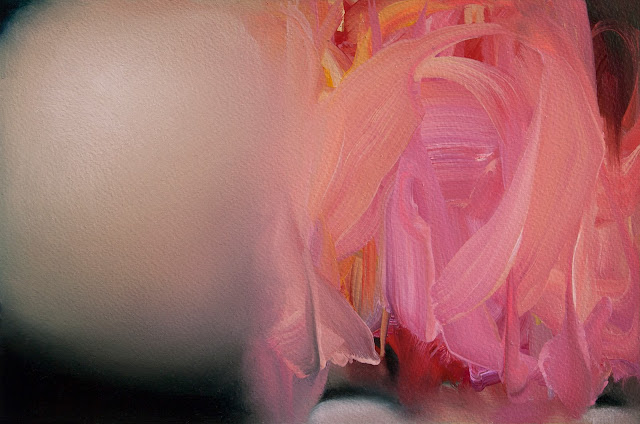RGS Paper Call Out - Contemporary Forms of Disorientation
RGS-IBG Annual Conference 2024, 27th- 30th August 2024.
Contemporary Forms of Disorientation
Session convenors:
Robin Finlay – Durham University, UK.
Victoria J. E. Jones – Northumbria University, UK.
Image credit: Clare Chapman, 'Untitled', 2021, Oil on paper, 23x24cm ©Clare Chapman. All rights reserved, 2024
https://www.clarechapman.com
The purpose of this paper session is to open up the forms and conditions of
disorientation that emerge in the contemporary contexts of neoliberal life and
everyday geopolitics.
Disorientation is a socio-spatial-temporal feeling. Conceptually, it involves the loss or detachment of orientating relations that enable a person to feel certain of their position in the world. Contemporary neoliberal life has opened new forms of disorientation. Recent catalytic events such as the Covid-19 pandemic, government austerity measures, the emergence of Black Lives Matter, the rise of populist politics, the proliferation of territorial conflicts, the escalation of global migration and displacement, the propagation of conspiracy theories, the decline of high street retailing, the pollution of water systems and the housing crisis have created the conditions that displace people, incite nativism and discrimination, disturb and destroy orientating infrastructures and expose the mutability of seemingly stable forms of political governance. Conversely, these disorientating events create the conditions for an individual or community to reorientate, create new relations, and construct positive change.
Recent work in geography has moved disorientation as a condition beyond the spatial and wayfinding, to a disruption of orienting relationships (Bissell and Gorman-Murray 2019; Dorignon and Nethercote 2021; Kinkaid 2020; Schmidt di Friedberg_2018; Simonsen 2013; Turnball et al 2022; Wylie 2021). This work has mostly drawn on Sara Ahmed's (2006) conceptualisation of disorientation via her 'Queer Phenomenology', and Ami Harbin’s (2016) ‘Disorientation and moral life ‘as a way of considering how disorientation shifts bodily and emotional perceptions of a situation.
Our call out is to find forms of
disorientation that are shaped by neoliberal and geo-political conditions.
These disorientations may be felt at an individual level or collectively. They
may be experienced as singular feelings or plural imbricating disorientations.
They may be felt in different intensities that feel pervasive or are acutely
front and centre. Disorientation may be felt by or in bodies, communities, or
socio-culturally. It may be felt by humans or non-humans. Materially or
immaterially. Disorientation may be experienced positively, negatively, or even
ambivalently. We welcome papers that explore disorientation found in a variety
of forms and conditions.
For more details contact
Victoria J E
Jones at victoria.j.e.jones@northumbria.ac.uk
or Robin Finlay at robin.finlay@durham.ac.uk
Otherwise, submit a 200-word abstract and your affiliation
to victoria.j.e.jones@northumbria.ac.uk
robin.finlay@durham.ac.uk by the 19th of
February 2024.
References
Ahmed, S. (2006a) Queer Phenomenology: Orientations, Objects, Others. Duke University Press: Durham NC and London.
Bissell, D. and Gorman-Murray, A. (2019) Disoriented geographies:
Undoing relations, encountering
limits. Transactions of the Institute of British Geographers 44,
pp.707-720.
Dorignon, L, Nethercote,
M. (2021) Disorientation in the unmaking of high-rise homes. Transactions of the Institute of British Geographers 2021(46),
pp.363- 377.
Harbin, A. (2016) Disorientation
and moral life. Oxford University Press: Oxford, UK.
Schmidt di
Friedberg, M. (2018) Geographies of Disorientation. Abingdon and Routledge: New York.
Simonsen, K.
(2013) In quest of a new humanism: Embodiment, experience and phenomenology as
criticalcgeography. Progress in
Human Geography, 37(1), pp.10-26.
Turnbull, J.
Platt, B. and Searle, A. (2022) For a new weird geography. Progress in Human
Geography. 46:5,pp
1207-1231.
Wylie, J. (2021) Dislocation: Disorientation: Disappearance: Distance.
In, Bissell, D.,Rose, M., and Harrison,
P. (eds) (2021), Negative Geographies: Exploring the Politics of Limits,
Nebraska, Lincoln, pp.189-205.

Comments
Post a Comment